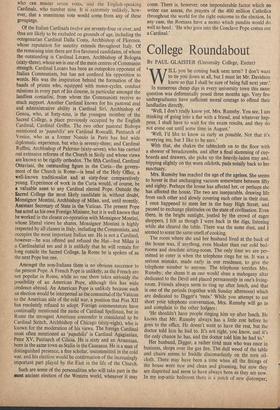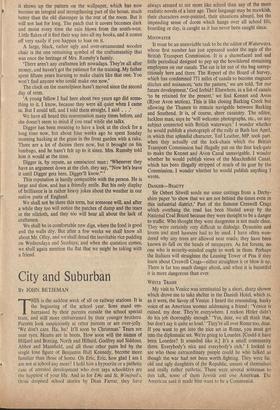College Roundabout
BY PAUL GLAISTER (University College, Exeter) ILL you be coming back next term? I don't want to tie you down at all, but I must let Mr. Davidson know so that t shall be sure of being full next year.' In numerous cheap digs in every university town this same question was deferentially posed three months ago. Very few undergraduates have sufficient moral courage to offend their landladies directly.
Well, I don't really know yet, Mrs. Rumsby. You see, I am thinking of going into a flat with a friend, and whatever hap- pens, I shall have to wait for the exam results, and they do not come out until some time in August.'
`Well, I'd like to know as early as possible. Not that it's worrying me, but I like to be sure.'
With that, she shakes the tablecloth on to the floor with a shower of breadcrumbs, and after a final slamming of cup- boards and drawers, she picks up the heavily-laden tray and. tripping slightly on the worn oilcloth, pads noisily back to her sanctuary.
Mrs. Rumsby has reached the age of the ageless. She seems to hover in that unchanging vacuum somewhere between fifty and eighty. Perhaps the house has affected her, or perhaps she has affected the house. The two are inseparable, drawing life from each other and slowly covering each other in their dust. I once happened to meet her in the busy High Street, and paused to exchange platitudes on the state of civilisation. Even there, in the bright sunlight, jostled by the crowd of eager shoppers, I felt as though I were back in the digs, listening while she cleared the table. There was the same dust, and 1 seemed to scent the same smell of cooking.
The room where she and her husband lived at the back of the house was, if anything, even bleaker than our cold bed- rooms and desolate sitting-room. The only time we are per- mitted to enter is when the telephone rings for us. It was a serious mistake, made early in our residence, to give the telephone number to anyone. The telephone terrifies Mrs. Rumsby; she shuns it as one would shun a mahogany altar dedicated to the Devil and placed permanently in one's living- room. Friends always seem to ring up after lunch, and that is one of the periods (together with Sunday afternoon) which are dedicated to Digger's `rests.' While you attempt to cut short your telephone conversation, Mrs. Rumsby will go in and complain to the other lodgers : `He shouldn't have people ringing him up after lunch. He knows that Mr. Rumsby always has a little rest before he goes to the office. He doesn't want to have the rest, but the doctor told him he had to. It's not right, you know, and it's the only chance he has, and the doctor told him he had to.'
Her husband, Digger, a• rather tired man who was once in business, sleeps over the gas fire. The dull wood of the table and chairs seems to huddle disconsolately on the torn oil- cloth. There may have been a time when all the fittings of the house were new and clean and gleaming, but now they are dispirited and seem to have always been as they are now. In my top-attic bedroom there is a patch of new distemper; it shows up the pattern on the wallpaper, which has now become an integral and strengthening part of the house, much better than the old distemper in the rest of the room. But 'it will not last for long. The patch that it covers becomes dark and moist every time the rain blows from the south-west. Little flakes of it find their way into all my books, and it comes off very easily if you happen to lean on it.
A large, black, rather ugly and over-ornamented wooden chair is the one remaining symbol of the craftsmanship that was once the heritage of Mrs. Rumsby's family.
'There aren't any craftsmen left nowadays. They're all after money, and haven't got the patience for the training. My father spent fifteen years learning to make chairs like that one. You won't find anyone who could make one now.'
The clock on the mantelpiece hasn't moved since the second day of term.
'A young fellow I had here about two years ago did some- thing to it. I know, because they were all quiet when I came in. But I could tell, and I told them straight. I said . .
We have all heard this conversation many times before, and she doesn't seem to mind if you read while she talks.
Digger has been meaning to have a look at the clock for a long time now, but about fdur weeks ago he spent Sunday morning hacking at the grass in the front garden with a rake. There are a lot of daisies there now, but it brought on his lumbago, and he hasn't felt up to it since. Mrs. Rumsby told him it would at the time.
Digger is, by repute, an omniscient man : 'Whenever they have an argument down at the club. they say. "Now let's leave it until Digger gets here. Digger'll know."' This reputation is hardly compatible with the person. He is large and slow, and has a friendly smile. But his only display of brilliance is in rather heavy jokes about the weather in our native parts of England.
We shall not be there this term, but someone will, and after a while they too will notice the patches of damp and the tears in the oilcloth, and they too will hear all about the lack of craftsmen.
We shall be in comfortable new digs, where the food is good and the walls dry. But after a few weeks we shall know all about Mr. 011ey, and we shall dread the inevitable rice pudding on Wednesdays and Sundays; and when the question comes, we shall again mention the flat that we might be taking with a friend.

































 Previous page
Previous page